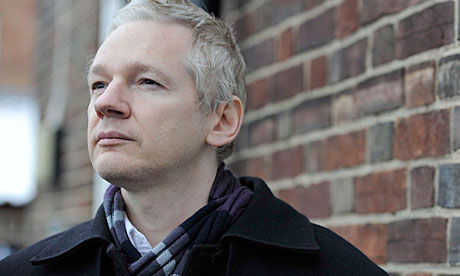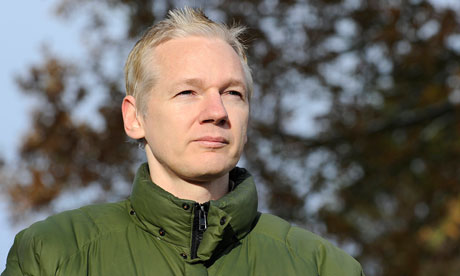Julian Assange: my fate will rest in Cameron's hands if US charges me
iWikiLeaks founder says it would be 'politically impossible' for Britain to extradite him to the US

Julian Assange said today that it would be "politically impossible" for Britain to extradite him to the United States, and that the final word on his fate if he were charged with espionage would rest with David Cameron.
In an interview with the Guardian in Ellingham Hall, the Norfolk country mansion where he is living under virtual house arrest, the founder of WikiLeaks said it would be difficult for the prime minister to hand him over to the Americans if there was strong support for him from the British people.
"It's all a matter of politics. We can presume there will be an attempt to influence UK political opinion, and to influence the perception of our standing as a moral actor," he said.
Assange is currently fighting extradition to Sweden. He strongly denies allegations of sexual misconduct with two Swedish women. But he believes the biggest threat to his freedom and to WikiLeaks, his whistleblowing website, emanates from a wrathful United States.
There is no evidence of any imminent US move to indict him. But according to Assange, the Obama administration is "trying to strike a plea deal" with Bradley Manning, the 23-year-old intelligence officer and alleged source of the more than a quarter of a million US diplomatic cables embarrassingly leaked last month. The US attorney general, Eric Holder, wants to indict Assange as a co-conspirator and is also examining "computer hacking statutes and support for terrorism", Assange claims.
Sitting in front of a log fire, his Apple MacBook Pro perched on his lap, Assange said his recent nine-day spell in Wandsworth jail had prepared him for the possibility that he might spend a long period in prison if indicted by the US. He said the prospect of solitary confinement was no longer an "intellectual abstraction" but a reality. The high court bailed him to Norfolk last Thursday, with his extradition hearing scheduled for 6-7 February.
He said: "Solitary confinement is very difficult. But I know that provided there is some opportunity for correspondence I can withstand it. I'm mentally robust. Of course it would mean the end of my life in the conventional sense."
If the US succeeded in removing him from the UK or Sweden, Assange said there was a "high chance" of him being killed "Jack Ruby-style" in the US prison system.
Since moving to Ellingham Hall, a Georgian country house and organic farm owned by his friend and supporter Vaughan Smith, Assange has given numerous media interviews. But he said he was fed up with the press and described an interview with BBC Radio 4's Today programme – in which John Humphrys grilled him on how many people he had slept with – as "awful".
Assange also took issue with a lengthy report in Saturday's Guardian setting out the prosecution allegations against him in Sweden. Assange acknowledged that the Guardian had a right to publish the material, dealing with his alleged encounters with the women. But he said it had been "sub-selected" and not placed properly in context. Swedish prosecutors have demanded that he return to Sweden to face further questions about the allegations.
Assange also said WikiLeaks did not have enough money to pay its legal bills, even though "a lot of generous lawyers have donated their time to us". He said legal costs for WikiLeaks and his own defence were approaching £500,000. The decisions by Visa, MasterCard and PayPal to stop processing donations to WikiLeaks – apparently following US pressure – had robbed the website of a "war chest" of around €500,000, he complained. This would have been enough to fund WikiLeaks' publishing operations for six months. At its peak the organisation was receiving €100,000 a day, he said.
According to publishing sources, however, Assange can take cheer from the fact that he has secured a seven-figure advance for a book about WikiLeaks and his life story. The sources suggest he is likely to receive £250,000 himself, allowing him to pay off some of his debts and to settle his personal defence fund, currently "paralysed". The book is to be published in the spring by Knopf in the US and Canongate in the UK, the sources suggest.
Assange – who has to wear his electronic tag in the bath, and report every day to Beccles police station – confessed he has no idea where he will be in a year's time. He described the next chapter in his life as "not yet predictable.
"Legally the UK has the right to not extradite for political crimes. Espionage is the classic case of political crimes. It is at the discretion of the UK government as to whether to apply to that exception."
He argued that Cameron and Nick Clegg were in a stronger position than the previous, Labour government to resist his extradition by Washington. "There is a new government, which wants to show it hasn't yet been co-opted by the US," he said, claiming that the security services – British and Australian – had a history of spying on and unduly influencing Labour politicians.
Many WikiLeaks supporters have now gone home for Christmas, leaving Assange with a scaled-down team over the holiday period, on an estate where the pheasant and grouse greatly outnumber the humans.
His immediate plan, he said, was to rest after a gruelling couple of months and then to continue with the staged global release of redacted US state department cables in the new year. Physically, he appeared somewhat wrung out, although very much composed and in good spirits.
Assange defended one of WikiLeaks' collaborators, Israel Shamir, following claims Shamir passed sensitive cables to Belarus's dictator, Alexander Lukashenko. Lukashenko has arrested 600 opposition supporters and journalists since Sunday's presidential election. The whereabouts and fate of several of the president's high-profile opponents are unknown.
Of Shamir, Assange said: "WikiLeaks works with hundreds of journalists from different regions of the world. All are required to sign non-disclosure agreements and are generally only given limited review access to material relating to their region. We have no reason to believe these rumours in relation to Belarus are true."
Over the past month the Guardian has published more than 200 articles based on the trove of US diplomatic dispatches obtained by WikiLeaks, and 739 of the cables themselves. All cables published by the Guardian and the four other international news organisations who had exclusive early access to the material have been carefully redacted to protect sources who could be placed in danger, and the redacted versions have been passed to WikiLeaks.
WikiLeaks now plans to begin sharing the cables with a wider group of regional news organisations. Julian Assange says all future cables released by WikiLeaks will either be redacted by other partner news organisations, or by WikiLeaks itself. The Guardian and its partners in the project, the New York Times, Der Spiegel, El Pais and Le Monde, will continue to share redactions with WikiLeaks for any cables they publish in future.

23